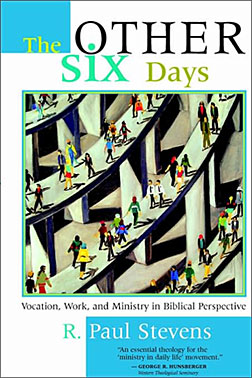« God at Work: An Appendix for the Laity (Section 2) | Home | Eyewitness Testimony in John’s Gospel »
God at Work: An Appendix for the Laity (Section 3)
By Mark D. Roberts | Thursday, January 24, 2008
In the series: God at Work: A Review of the Book by David Miller
Permalink for this post / Permalink for this series
Yesterday I put up my first suggestion for how lay people might help their churches be more supportive of their efforts to live out their faith in the workplace. That first suggestion was:
Recommendation #1: Invest in Christian fellowship and help your fellowship to deal with issues of faith at work.
Today I’ll add to it.
Recommendation #2: Talk it up.
If you’re a lay person in a church and want your church to do more to support you and others in workplace discipleship, then talk about it. Whether in organized classes and small groups, or in informal conversation at a retreat or on the church patio, talk about your vision and challenges. It could be as simple as saying, “Hey, I’m really learning that my work can be a context for ministry. Do you have any ideas about that?” You might be surprised what you hear. But even if the person you’re talking with has never thought about this before, chances are you’ll find yourself in a valuable conversation. God may very well use you to give others a new vision for faith at work discipleship.
The kind of talking it up I referring to here doesn’t take permission or time or money or anything complicated. It’s the sort of thing you could begin to do next Sunday. Now it’s possible, of course, that informal conversation will lead to something more planned and programmatic. Great! But if not, you’ll be helping to raise the consciousness of your fellow saints and, I’d expect, getting some of the support you desire. Remember, the church isn’t the program or the preacher; it’s the people. As much as faith at work should impact both program and preacher, the church can do a lot to support workplace ministry without either.
 In my experience, the notion of faith at work can be an exciting and empowering one for lay people. If you start talking about it, chances are others will pick up the conversation. You might be the small stone that leads to waves of renewal throughout your church.
In my experience, the notion of faith at work can be an exciting and empowering one for lay people. If you start talking about it, chances are others will pick up the conversation. You might be the small stone that leads to waves of renewal throughout your church.
Recommendation #3: Gather people with common concerns and vision.
This recommendation is an outworking of the Recommendation #1: Invest in Christian fellowship and help your fellowship to deal with issues of faith at work. One way to do this is to gather together people like yourself, people who seek to live out their faith at work.
Suppose, for example, that you implement recommendation #2 and start talking up lay ministry in the world. It wouldn’t surprise me if, before long, you found a number of people who shared your passion. You might propose a regular gathering for study, conversation, and prayer. Or you might get together with a couple other people to sponsor an adult education class at church. One person wrote to me with his experience at his church:
There were many ways [my church] equipped me for ministry at work. One of the most powerful was not directly from [the church itself], but [the church] nevertheless facilitated it. . . . So my specific answer to your question would be “even if your church does not directly offer this kind of training (which [my church] does), there are opportunities through mission partnerships to provide access and support to ministries that specialize in equipping disciples for workplace ministry.”
Recommendation #4: Help members of your church become familiar with faith at work resources.
If your church has a bookstore, suggest some faith at work books. Or donate a few to the church library. You might write a short piece for your church newsletter, pointing to resources you’ve found to be helpful. Etc. etc. etc.
There are many, many resources available. One was suggested in a comment on this blog series, by the author, no less. Greg Heylin has written a book called Work and Spirituality: Finding the Balance. I have not read this book, but I have ordered it. You can find a helpful overview with excerpts from this website. It looks very solid. And it will be interesting to see things from an Irish Catholic perspective.
 Of books I’ve read, I would heartily recommend The Other Six Days: Vocation, Work, and Ministry in Biblical Perspective by R. Paul Stevens. This book is written for a lay audience (thank goodness!) but it has quite a bit of biblical content. Paul Stevens is one of the real leaders in the faith at work movement. For several years he had one of the most interesting chairs at Regent College: the David J. Brown Family Professor of Marketplace Theology and Leadership. If you’re not familiar with Paul Stevens, be sure to check out his excellent website.
Of books I’ve read, I would heartily recommend The Other Six Days: Vocation, Work, and Ministry in Biblical Perspective by R. Paul Stevens. This book is written for a lay audience (thank goodness!) but it has quite a bit of biblical content. Paul Stevens is one of the real leaders in the faith at work movement. For several years he had one of the most interesting chairs at Regent College: the David J. Brown Family Professor of Marketplace Theology and Leadership. If you’re not familiar with Paul Stevens, be sure to check out his excellent website.
Finally, let me mention once again the website associated with my ministry at Laity Lodge. The High Calling of Our Daily Work.org is filled with practical wisdom, stories, and Bible studies to encourage people to live out their faith in the workplace. My Daily Reflection on this site regularly connects Scripture and work in a prayerful way.
Also, there is a High Calling blog network featuring blogs from Christians in various professional categories. Lots of great material here. And, if you’re so inclined, you can start your own “faith at work” blog through the High Calling blog network.
Tomorrow I’ll put up a couple more recommendations.
Topics: God at Work |
Comments
Thanks for your willingness to make a comment. Note: I do not moderate comments before they are posted, though they are automatically screened for profanities, spam, etc., and sometimes the screening program holds comments for moderation even though they're not offensive. I encourage open dialogue and serious disagreement, and am always willing to learn from my mistakes. I will not delete comments unless they are extraordinarily rude or irrelevant to the topic at hand. You do need to login in order to make a comment, because this cuts down on spam. You are free to use a nickname if you wish. Finally, I will eventually read all comments, but I don't have the time to respond to them on a consistent basis because I've got a few other demands on my time, like my "day job," my family, sleep, etc.
You must be logged in to post a comment.














